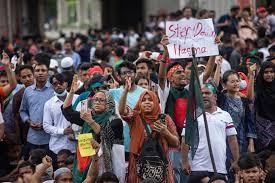
Bangladesh, a vibrant country in South Asia, has recently attracted global attention amid a political storm. In the incident, Bangladesh's prime minister announced his resignation after weeks of protests, a decision that not only shook the domestic political landscape, but also attracted widespread international attention.
Recent mass protests have erupted in Bangladeshi cities, not sudden but the result of a long history of socioeconomic problems and political discontent. First, the growing economic inequality and the widening gap between the rich and the poor have made life harder for the people at the bottom, who question the government's economic policies and management capabilities.Second, the corruption problem is deeply rooted, and the public trust in the political elite has fallen sharply, arguing that the government has failed to effectively combat corruption and protect the public interest. In addition, deficiencies in environmental issues, education, medical care and other areas of people's livelihood have also exacerbated public dissatisfaction.
Over time, the protests escalated, shifting from peaceful demonstrations to more intense street conflicts. Protesters have asked the government to respond to their demands with the necessary reforms.These protests have not only affected the normal social order, but also brought great political pressure to the government. In the face of strong public protests, the government has taken a variety of steps to try to calm the situation, but with limited effect.
In the face of weeks of protests and intense political pressure on the government, the Bangladeshi prime minister finally made the decision to resign. Behind this, it reflects the deep-seated problems in Bangladesh's social and economic field.As a developing country with a large population, Bangladesh also faces challenges such as uneven distribution of resources, limited employment opportunities and lagging infrastructure.These problems are intertwined, forming a complex network of social contradictions, making it difficult for any single reform measure to work quickly. Therefore, the resignation of the prime minister is only the first step in solving these problems, and the real challenge lies in how to promote the sustainable development of the country through comprehensive and systematic reforms.
It is worth saying that the fluctuations in public sentiment have had an important impact on the policy. In today's increasingly developed social media, protest messages spread rapidly, and public emotions are easy to be instigated and amplified.At the same time, the international focus on the political situation in Bangladesh has also increased the pressure on its internal reform. International aid agencies, neighboring countries and international organizations have spoken out.We call for resolving differences through dialogue and maintaining social stability and economic development. This external pressure has partly accelerated the resignation of the prime minister.
With the resignation of the Prime Minister, Bangladesh will face a series of political challenges and opportunities. The government needs to quickly form a new leadership to stabilize the domestic situation and work to address the various issues raised by the protesters.At the same time, the government also needs to strengthen communication and consultation with all sectors of society to establish a more extensive and stable political alliance. In addition, the support and assistance of the international community will also have an important impact on the political stability and development of Bangladesh.
The decision of the Bangladeshi prime minister to resign after weeks of protests is a result of multiple factors. It not only reflects the complexity of the country's political ecology and the profound changes in the people's demands, but also points out the direction for the future reform and development.In the future of both challenges and opportunities, the government and people of Bangladesh need to work together to write a new chapter of national development with wisdom and courage.

The U.S. third-quarter GDP growth rate, strikingly highlighted at 4.3%, not only surpassed market expectations but also earned the label of "the fastest in two years."
The U.S. third-quarter GDP growth rate, strikingly highligh…
Recently, US personnel intercepted a "Century" super oil ta…
According to Xinhua News Agency, the subtle changes in the …
The rapid development of artificial intelligence has brough…
In December 2025, Taiwan's political scene was shaken by a …
When Apple appears for the Nth time on the list of penaltie…